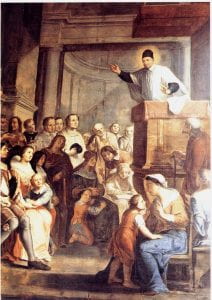“Revitalizing our Identity at the beginning of the Fifth Century of the Congregation of the Mission” — Theme of the C.M. XLIII General Assembly 2022
 Each year on the feast of the Conversion of St. Paul the Apostle, we remember the beginning of the Congregation of the Mission (C.M.). According to St. Vincent de Paul, this happened in Folleville, France, on January 25, 1617, when he preached his “first sermon of the Mission.”(1) Many say that experience with a dying man transformed Vincent’s heart and imbued him with a desire to serve those in need.
Each year on the feast of the Conversion of St. Paul the Apostle, we remember the beginning of the Congregation of the Mission (C.M.). According to St. Vincent de Paul, this happened in Folleville, France, on January 25, 1617, when he preached his “first sermon of the Mission.”(1) Many say that experience with a dying man transformed Vincent’s heart and imbued him with a desire to serve those in need.
This historical event is an important one for DePaul University, though it is not widely celebrated. The Congregation of the Mission (commonly called “Vincentians”) founded our university 123 years ago. DePaul’s history and identity are deeply linked to the values and convictions of the Congregation in the United States.
Originally, Vincent founded the Congregation of the Mission to provide direct service to all those living in poverty, especially “the most abandoned,”(2) and for the formation and education of Catholic clergy in need of reform. These original intentions have evolved with time, especially over the past 50 years.
Today the Congregation of the Mission works together with many other branches of the Vincentian Family. This wider family includes the Daughters of Charity and other orders of religious sisters, as well as lay members of the worldwide International Association of Charities, and the Society of St. Vincent de Paul. They comprise an ever-growing network of people and organizations who provide direct spiritual and material service, advocacy, and the promotion of systemic change.
In many ways, the primary Vincentian mission along with its communal approach have not changed. To better respond to all kinds of needs Vincent summoned as many as he could, rich, poor, humble, and powerful, and used all means to inspire them to serve people living in poverty.(3) As a Catholic priest, Vincent privileged the image of Christ. Based on the Gospel of Luke, ‘the evangelizer of the poor’ [Luke 4, 16-22], he prompted all his collaborators to help the poor directly and indirectly as Jesus did.
The Congregation of the Mission, from the time of Vincent de Paul, and through his inspiration, recognizes itself as called by God to carry out the work of integrally serving the poor. Officially called “Congregatio Missionis,” they are also called “Vincentians” in Anglophone countries, “Paules” in Spain, “Missioners” in Slavic lands, and in Latin America they are known as “Vicentinos.” The unofficial motto of the Congregation: Evangelizare pauperibus misit me [He has sent me to evangelize the poor] sums up the works of Jesus the Congregation endeavors to follow.
While we celebrate the founding of the Congregation of the Mission in 1617, the official date of its institution is noted to be April 17, 1625. On that day, encouraged by Madame de Gondi, the lords of the Gondi family, in whose territories Vincent de Paul served as Chaplain, signed a contract with him in which they provided funding to support a group of priests to serve impoverished people in the countryside. This act gave needed economic sustainability to the project of the Congregation.
Vincent ultimately created the community he had dreamed of. By the day of his death, September 27, 1660, twenty-six Vincentian communities had been formed: nineteen in France, four in Italy, two in Barbary (Northern Africa), and one in Poland. And, by the time of the French Revolution of 1789, when religious communities were suppressed in France, a great dissemination of the Congregation had taken place around the world, with missions in the Middle East, in Asia, and soon thereafter in the Americas. Especially significant were the Congregation’s missionary efforts in China. Today the Congregation has more than 3,000 members, priests, and brothers, serving in 81 countries. They continue to provide a wide array of services including education, spiritual and pastoral care, direct service to the poor, and socio-political advocacy, while remaining dedicated to systemic change and collaborations that will end poverty and homelessness.
As we know, one of their projects was DePaul University, founded in 1898 to serve the children of immigrants in Chicago who needed both access to education and a chance to escape poverty. Without Foundation Day, DePaul as we know it would not exist. That it does, and that we are now a part of more than two million Vincentian Family members worldwide, is certainly something worth celebrating on the 25th.
1) Conference 112, Repetition of Prayer, 25 January 1655, CCD, 11:162-164.
2) Conference 164, Love for the Poor, January 1657, CCD, 11:349.
3) See, for example, Constitutions and Statutes of the Congregation of the Mission (Rome, 1984), 10. Online at: https://via.library.depaul.edu/cm_construles/23/
Reflection by Rev. Guillermo Campuzano, C.M., Vice President of Mission and Ministry
The St Vincent de Paul Society is a lay Catholic organisation that aspires to live the gospel message by serving Christ in the poor with love, respect. It is important for all Vincentians to educate themselves about the origins of the of the birthday of the Blessed Mother, to whom he had such a great devotion.